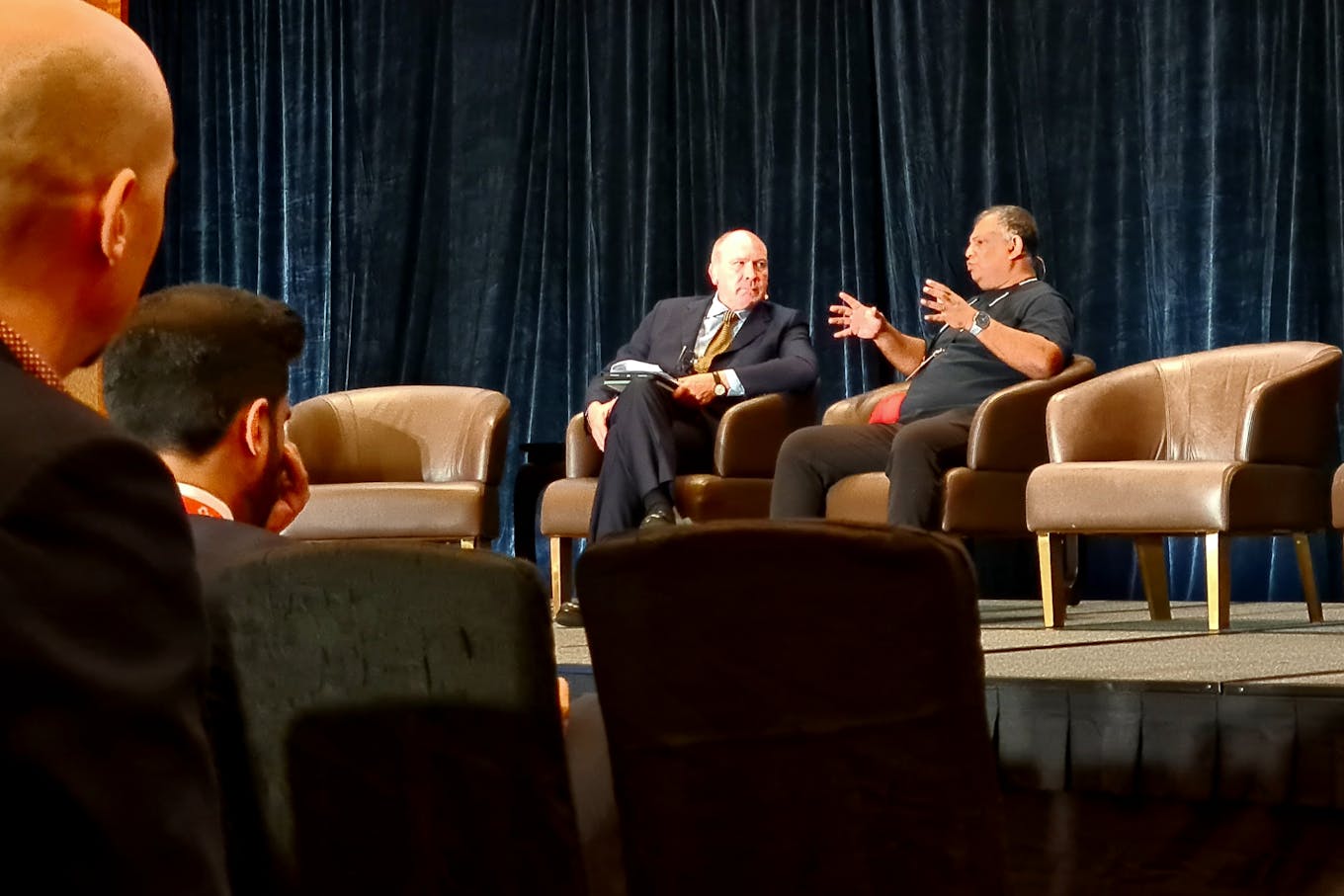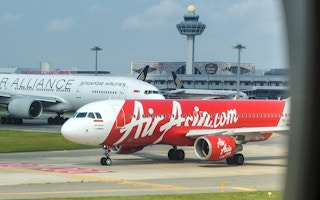Policymakers should fund research into cleaner jet fuel and hydrogen infrastructure to green the aviation industry, instead of creating mandates and taxes, according to the head of Capital A, the parent company of one of Asia’s largest airlines AirAsia.
To continue reading, subscribe to Eco‑Business.
There's something for everyone. We offer a range of subscription plans.
- Access our stories and receive our Insights Weekly newsletter with the free EB Member plan.
- Unlock unlimited access to our content and archive with EB Circle.
- Publish your content with EB Premium.
Levies on the aviation industry need to be fair, Capital A chief executive Tony Fernandes added, noting how commercial flying is still recovering from the Covid-19 pandemic but oil refiners are currently making big profits.
Fernandes’ comments at The Economist Impact’s Sustainability Week Asia event on Tuesday (7 February) adds to the pressure against stricter regulations on the hard-to-abate aviation industry that contributes to about 2 per cent of global carbon emissions.
“We could do a lot more in terms of [green] technology, but we are struggling to survive. Imagine going to a bank right now and saying, please give us a billion dollars to finance green technology. I am not going to even get a cup of coffee,” Fernandes said.

Tony Fernandes (right), chief executive of Capital A Berhad, parent of low-cost carrier AirAsia, speaking at Economist Impact’s Sustainability Week Asia. Image: Eco-Business/ Liang Lei.
“If governments invested in sustainable fuels, I think [the uptake] would be much quicker. There is technology there, but there isn’t enough supply, and the cost is prohibitive,” he added.
Sustainable aviation fuel, or SAF, is produced from sources including waste cooking oil and leftover crops, with emissions savings – said to be as high as 80 per cent – arising from the reuse of raw materials, compared to if the kerosene was refined from crude.
Cleaner fuels are many times more expensive than conventional options today, and global uptake is only about 0.1 per cent of total fuel used.
Some countries, like India, have started mulling mandates for airlines to use SAF, part of the consideration being that higher demand lowers cost. The European Union is considering asking airlines to fuel their jets with 2 per cent SAF by 2025 and ramping up in subsequent decades. In response, Air France is already blending 1 per cent SAF in flights departing France.
But Fernandes believes such rules will produce little climate benefit while raising ticket prices for customers, at a time when supply is low and costs are high.
“I disagree with [SAF] mandates, I disagree with carbon taxes,” he told Eco-Business, adding that government funding could help in the same way as how Covid-19 vaccines were quickly developed. The EU plans to tax domestic flight emissions within its jurisdiction, though it dropped similar efforts on international departures.
“I would rather they focus on [funding technology] than talking about carbon taxes and all these [measures] which are just popular,” Fernandes said.
Higher costs could also attract customer pushback.
“Everyone wants a cheap flight. People complain about aviation being polluting, but when we ask them to pay [for sustainability measures], they scream bloody murder,” said Capital A chief sustainability officer Yap Mun Ching at Sustainability Week Asia.
Fernandes said that airlines in Asia will need more time to recover from the pandemic, due to “draconian” Covid-19 rules which puts the regional industry at least six months behind the recovery seen in the United States and Europe.
In 2022, AirAsia group fell into a ‘PN17’ category of distressed firms listed on Bursa Malaysia, the country’s stock exchange, though Fernandes has said last month that he expects recovery later this year, when higher passenger traffic is expected. The low-cost carrier is Malaysia’s largest airline, with over 200 aircraft in its fleet.
AirAsia has “more or less” survived the pandemic blow, but it would take another six months to get all its planes flying, Fernandes said.
Across Asia, commercial aviation is expected to rebound, especially with China relaxing its Covid-19 rules in December. Last month, Jane Sun, the chief executive of travel services giant Trip.com, said that domestic travel in China could already be exceeding 2019 levels, and that there is a “three-digit surge” in demand for international flights with China.
Globally, flights have returned to three-quarters of pre-pandemic levels, according to the International Air Transport Association (IATA).
Last October, over 190 countries worldwide agreed to set an aspirational 2050 net-zero emissions target for the aviation industry. IATA has said that greener jet fuel could contribute to about 65 per cent of emissions reductions needed to reach that goal.
However, critics say some forms of SAF, such as those produced with palm oil, may exacerbate large-scale farming and deforestation, while existing waste oil supply chains may not be reliable enough to prevent virgin materials from being illegally slipped in.
Calls to downscale commercial aviation have largely not flown either, with passenger traffic in emerging market regions, including Asia, expected to rise sharply in the years ahead.










